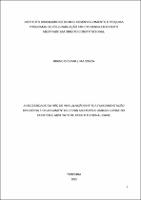Use este identificador para citar ou linkar para este item:
https://repositorio.idp.edu.br//handle/123456789/4779| Título: | A necessidade ou não de vinculação entre a fundamentação decisória e os argumentos levantados pelo amicus curiae no controle abstrato de constitucionalidade |
| Autor(es): | Souza, Bruno Giovani Lima |
| Palavras-chave: | Amicus curiae;Controle de constitucionalidade;Fundamentação decisória do STF;Argumentação jurídica |
| Data de submissão: | 2023 |
| Citação: | SOUZA, Bruno Giovani Lima. A necessidade ou não de vinculação entre a fundamentação decisória e os argumentos levantados pelo amicus curiae no controle abstrato de constitucionalidade. 2023. 96 f. Dissertação (Mestrado em Direito Constitucional) - Instituto Brasileiro de Ensino, Desenvolvimento e Pesquisa, Teresina, 2023. |
| Resumo: | A presente pesquisa analisa a eventual exigibilidade de vinculação entre a fundamentação
decisória do STF e os argumentos apresentados pelos amici curiae no controle abstrato de
constitucionalidade. Analisa se é necessário que a fundamentação do acórdão enfrente todos os
argumentos deduzidos pelos amici curiae para que a decisão seja considerada legítima. O
estudo justifica-se por contribuir no entendimento sobre a natureza da participação do amicus
curiae e o grau de relevância atribuível aos seus argumentos, o que pode refletir na qualidade
das decisões do STF. A metodologia utilizada foi a revisão da literatura relativa à teoria da
decisão e da argumentação jurídica. A pesquisa parte de um exame sobre o papel exercido pelo
amicus curiae no processo, considerando suas origens e sua previsão em nosso ordenamento,
abordando a tentativa de democratizar e pluralizar o processo de interpretação constitucional
no STF. Em seguida, são examinadas as implicações que a natureza objetiva do controle
abstrato de constitucionalidade traz ao processo dialético entre os participantes do processo,
observando os limites de atuação desses atores, em especial as faculdades processuais dos amici
curiae e os critérios utilizados para sua admissão. Trata da fundamentação jurídica como meio
de legitimação da decisão judicial, ressaltando o papel que a interpretação e a argumentação
jurídica assumem na sua construção. Aborda-se a teoria da argumentação de Chaïm Perelman
no processo deliberativo do STF e na elaboração dos respectivos fundamentos decisórios.
Analisa a disciplina conferida à fundamentação das decisões judiciais pelo Código de Processo
Civil de 2015. Por fim, conclui se o princípio da fundamentação analítica é aplicável ao controle
abstrato de constitucionalidade no que se refere aos argumentos levantados pelos amici curiae. |
| Abstract: | This research analyzes the eventual enforceability of a link between the Supreme Court decision-making basis and the arguments presented by the amici curiae in the abstract control of constitutionality. It analyzes whether it is necessary for the reasoning of the judgment to face all the arguments deduced by the amici curiae for the decision to be considered legitimate. The study is justified by contributing to the understanding of the nature of the participation of the amicus curiae and the degree of relevance attributable to its arguments, which may reflect on the quality of the decisions of the Supreme Court. The methodology used was the review of the literature on the theory of decision and legal argumentation. The research starts from an examination of the role played by the amicus curiae in the process, considering its origins and its prediction in our legal system, addressing the attempt to democratize and pluralize the process of constitutional interpretation in the Supreme Court. Then, the implications that the objective nature of the abstract judicial review brings to the dialectical process between the participants of the process are examined, observing the limits of action of these actors, in particular the procedural faculties of the amici curiae and the criteria used for their admission. It deals with the legal basis as a means of legitimizing the judicial decision, highlighting the role that legal interpretation and argumentation assume in its construction. Chaïm Perelman's theory of argumentation is discussed in the deliberative process of the Supreme Court and in the elaboration of the respective decision-making grounds. It analyzes the discipline given to the reasoning of judicial decisions by the Civil Procedure Code of 2015. Finally, it concludes whether the principle of analytical reasoning is applicable to the abstract control of constitutionality with regard to the arguments raised by the amici curiae. |
| URI: | https://repositorio.idp.edu.br//handle/123456789/4779 |
| Aparece nas coleções: | Mestrado Acadêmico em Direito Constitucional |
Arquivos associados a este item:
| Arquivo | Descrição | Tamanho | Formato | |
|---|---|---|---|---|
| DISSERTAÇÃO_BRUNO GIOVANI LIMA SOUZA_MESTRADO EM DIREITO CONSTITUCIONAL_2023.pdf | 964.74 kB | Adobe PDF |  Visualizar/Abrir |
Os itens no repositório estão protegidos por copyright, com todos os direitos reservados, salvo quando é indicado o contrário.
